| Srl | Item |
| 1 |
ID:
156697
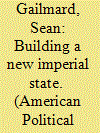

|
|
|
|
|
| Summary/Abstract |
Separation of powers existed in the British Empire of North America long before the U.S. Constitution of 1789, yet little is known about the strategic foundations of this institutional choice. In this article, I argue that separation of powers helps an imperial crown mitigate an agency problem with its colonial governor. Governors may extract more rents from colonial settlers than the imperial crown prefers. This lowers the Crown’s rents and inhibits economic development by settlers. Separation of powers within colonies allows settlers to restrain the governor’s rent extraction. If returns to settler investment are moderately high, this restraint is necessary for colonial economic development and ultimately benefits the Crown. Historical evidence from the American colonies and the first British Empire is consistent with the model. This article highlights the role of agency problems as a distinct factor in New World institutional development, and in a sovereign’s incentives to create liberal institutions.
|
|
|
|
|
|
|
|
|
|
|
|
|
|
|
|
| 2 |
ID:
139287
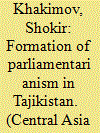

|
|
|
|
|
| Summary/Abstract |
This article examines the comparative legal, theoretical, and historical aspects of parliamentarianism. The author analyzes the formation of Tajik parliamentarianism and describes its primary characteristics. He also gives the reasons for the formation of parliamentarianism in Tajikistan and the obstacles hindering it.
|
|
|
|
|
|
|
|
|
|
|
|
|
|
|
|
| 3 |
ID:
146247
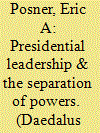

|
|
|
|
|
| Summary/Abstract |
The presidents who routinely are judged the greatest leaders are also the most heavily criticized by legal scholars. The reason is that the greatest presidents succeeded by overcoming the barriers erected by Madison's system of separation of powers, but the legal mind sees such actions as breaches of constitutional norms that presidents are supposed to uphold. With the erosion of Madisonian checks and balances, what stops presidents from abusing their powers? The answer lies in the complex nature of presidential leadership. The president is simultaneously leader of the country, a party, and the executive branch. The conflicts between these leadership roles put heavy constraints on his power.
|
|
|
|
|
|
|
|
|
|
|
|
|
|
|
|
| 4 |
ID:
146261
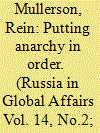

|
|
|
|
|
| Summary/Abstract |
Every political system, and the international system is not an exception, faces the problem of power. Without effective power there is anarchy and chaos while concentration of power suppresses individual as well as collective liberties. Within societies organized as states, i.e. relatively hierarchical societies, one of the most effective remedies against excessive concentration of power is the principle of separation of powers into legislative, executive and judicial branches and their balance. International society (or system) is a horizontal or relatively anarchical system where power is much more dispersed in comparison with societies organized as states.
|
|
|
|
|
|
|
|
|
|
|
|
|
|
|
|
| 5 |
ID:
140761
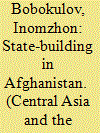

|
|
|
|
|
| Summary/Abstract |
It appears that the multinational and multiconfessional nature of Afghan society itself is the main reason prompting examination of the problem raised in this article. Recently, there has been increasingly lively discussion about whether Afghanistan will be able to choose a development model that could ensure long-term peace and stability in the “heart of Asia.”
|
|
|
|
|
|
|
|
|
|
|
|
|
|
|
|
| 6 |
ID:
129284
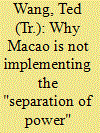

|
|
|
|
|
| Publication |
2012.
|
| Summary/Abstract |
The article presents a speech by Zhang Xiaoming, Deputy Director of the Hong Kong and Macao Affairs Office of the State Council, delivered at the High-Level Seminar on Macao's Basic Law on July 20, 2011, in which he discussed the separation of powers, the government of the Special Administrative Region (SAR), and legislative power practice.
|
|
|
|
|
|
|
|
|
|
|
|
|
|
|
|